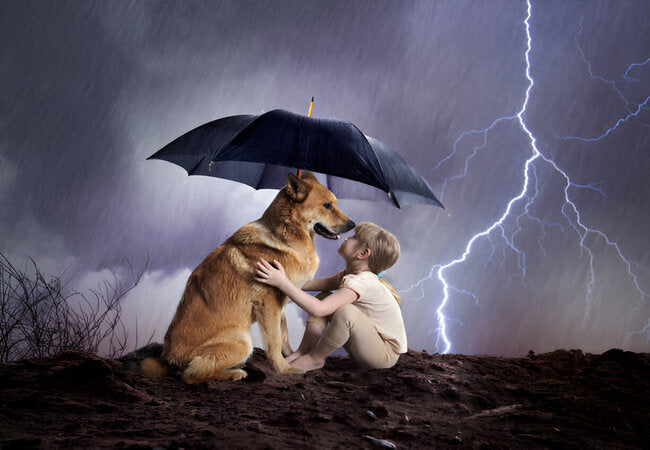How to Help Dogs with Noise & Thunderstorm Phobias in 2025 – Vet‑Approved Anxiety Guide 🐶⚡️

In this article
How to Help Dogs with Noise & Thunderstorm Phobias in 2025 – Vet‑Approved Anxiety Guide 🐶⚡️
By Dr. Duncan Houston BVSc
Noises like thunder, fireworks, sirens, and vacuum cleaners can be terrifying for many dogs, triggering intense panic and anxiety. As a veterinarian, I’ve helped countless families navigate noise phobia using a combination of behavior strategies, medications, and support tools. This vet‑approved 2025 guide explores causes, signs, treatments (from pressure wraps to desensitization), and personalized action plans to help your dog feel safe and calm during scary sounds.
1. What Is Noise Phobia vs. Fear?
Fear is a normal reaction to real threats (freeze, flee). Phobia is an excessive, persistent fear fueled by irrational dread—e.g., hiding, trembling, or destroying furniture at the sound of thunder.
Noise phobia is extreme fear triggered by sounds like fireworks or vacuum cleaners.
Thunderstorm phobia is broader, involving noise, lightning, wind, smells, and pressure changes.
2. Signs & Severity of Noise Phobia
- Hiding, escape attempts, pacing, drooling, shaking, or other behaviors.
- Urinating or defecating in fear.
- Destructive behavior or self-harm in a panic.
- Exaggerated startle, restlessness, or howling.
- Symptoms worsen over time and with repeated exposure.
3. Why Do Dogs Develop Noise Phobias?
- Genetic predisposition, particularly in herding or rescue breeds.
- Insufficient early exposure and lack of socialization.
- Unintentionally reinforcing fear through comforting or punishment.
- Multisensory storm triggers—flashes, pressure, smell—worsen thunderstorm fears.
4. Treatment Strategies
A. Behavior Modification
- Desensitization: gradual exposure to recordings, starting low and increasing volume.
- Counter-conditioning: Pair scary sounds with high-value treats or play.
B. Comfort & Environmental Management
- Pressure wraps (e.g., ThunderShirt): calm dogs with steady pressure.
- Sound masking: white noise, music, or fans to reduce stimulus.
- Safe space: create a quiet, comfortable retreat with cozy bedding.
- Stay calm: reassuring methods (treats, petting) don’t reinforce fear.
C. Exercise & Enrichment
Provide mental and physical activity before storms—walks, puzzle toys—to reduce anxiety
D. Medication Options
Use under veterinary supervision:
- Sileo (dexmedetomidine gel): FDA‑approved for noise phobia, used pre-event.
- Benzodiazepines (diazepam, lorazepam), SSRIs/SNRIs (fluoxetine, paroxetine, sertraline) for anxiety disorders.
- Behavioral supplements: pheromone diffusers, L‑tryptophan, and CBD under vet guidance.
5. Professional Support & When to Escalate
Consult a behaviorist or vet when:
- Panic is severe: self-harm, escape behavior, destructiveness — intervention needed.
- Symptoms generalize to multiple noises, and daily life is affected.
- Medication side effects or lack of response—team-based planning is essential.
6. When Comfort Helps vs. Hinders
Comforting your dog during fear doesn’t “teach fear” but can build trust—just avoid overly emotional reinforcement.
7. Case Study: Thunderstorm Phobia
Thunderstorm phobia involves layered triggers—sound, light, air pressure—and isn’t just noise phobia.
- Start early: desensitize puppies with controlled storm recordings.
- Combine tools: wrap, sound masking, treats, and pre-event medication.
- Track behavior: note progress, setbacks, and adjust the plan.
8. Quick Reference Table
| Approach | Action | When to Use |
|---|---|---|
| Desensitization | Low-volume noise exposures + treats | At least weeks/weeks before the event |
| Counter-conditioning | Reward calm behavior during noise | Any fearful reaction |
| Pressure wrap | Use a snug garment during storms/fireworks | Moderate fear level |
| Medication | Sileo, SSRIs, benzos | Severe phobia under vet advice |
| Sound masking | Play white noise/music | During event onset |
| Safe space | Quiet, cozy retreat | Whenever noise triggers occur |
📱 Ask A Vet App 2025 Support
Through the Ask A Vet app you can:
- 📹 Upload videos of anxious behavior for expert assessment.
- 🗂 Access tailored desensitization and counter-conditioning plans.
- 💬 Receive medication guidance and follow-up check-ins.
Get custom, compassionate support to help your dog through scary noises. 🐾📲
❤️ Final Thoughts
Noise and storm phobias can push dogs into extreme fear, but with consistent, compassionate intervention, your dog can learn to manage—and even overcome—these fears. A combination of behavior modification, environmental support, gentle comfort, and veterinary-approved treatments offers real hope. In 2025, we honor our dogs by providing empathetic, science-backed care so they can feel safe, confident, and loved—even when the thunder rolls.
Need tailored help? Visit AskAVet.com or download the Ask A Vet app for expert, personalized anxiety support anytime.






